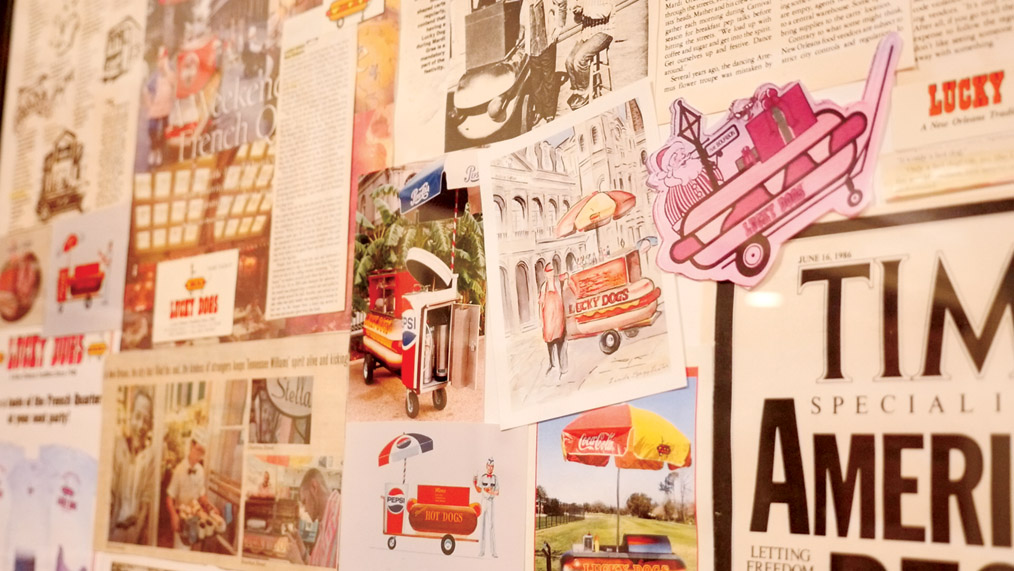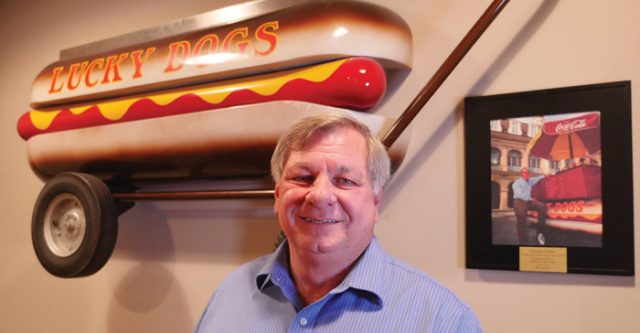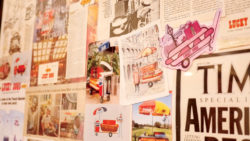Foodways
A Dog’s Life
Jerry Strahan isn't just the manager at Lucky Dogs – he's also the historian
Published: December 1, 2016
Last Updated: November 22, 2021

The Lucky Dog cart is as much a part of life in the French Quarter as wrought-iron balconies, woozy tourists and oversized drinks. If the street is the place where the world gets its first taste of New Orleans, Lucky Dogs might be classified as an international flavor. Founded in 1947, the company is part of Louisiana culinary history. Fortunately, Lucky Dog general manager Jerry E. Strahan is also a historian. His third book, “Lucky Dogs: From Bourbon Street to Beijing and Beyond” (University Press of Mississippi, 2016), chronicles the company’s time in China, surviving Katrina, and those inimitable Vieux Carré vendors. He spoke to LCV’s Christopher Robert at the Lucky Dog headquarters on Gravier Street.
How did Lucky Dogs get started?
In 1947, two brothers, Stephen and Erasmus Loyacano, started the street vending business. They owned it until 1970. One of the brothers passed away. The other brother then sold it to Doug Talbot. Doug had owned Orange Julius in the French Quarter, right on St. Louis and Bourbon next to the Chris Owens Club. I started working for Doug in 1968 at the Orange Julius in Lakeside Mall, and then at the Orange Julius in the French Quarter. He passed away last year. Now his wife and two sons own the business. I have been here now managing the company for 40 years.

Jerry Strahan at Lucky Dogs headquarters. Photo by Chris Robert
Lucky Dogs carts hold a special status in the Quarter. Walk us through that history.
The design of the cart was developed in 1947 by the Loyacanos, and that design basically has to stay the same due to a 1976 U.S. Supreme Court decision, City of New Orleans versus Nancy Dukes. Nancy Dukes was selling sandwiches out of a wheelbarrow, I believe, in Jackson Square. The city did not want that to occur. Well, they created what was called a grandfather clause. The basis that they decided to shut it down on was that, if you hadn’t operated more than eight years, you could not continue to operate. Miss Dukes sued, the city appealed, they won, she appealed. No one in their great imagination ever dreamed the Supreme Court would hear this case. The city was just stalling to write the ordinance.
The Supreme Court chose to hear the argument and ruled that, in order to preserve the historic character and charm of a given area, you may discriminate even though you are both equal under the eyes of the law. The Supreme Court ruled that Lucky Dogs had become as much as part of the Vieux Carré as wrought iron in Jackson Square.
You’re a published historian and the general manager of Lucky Dogs. How did those two roles evolve and intersect?
I was entering my freshman year at the University of New Orleans. Doug would call me and want me to work catering events for them or work busy holidays. I continued my education, continued working at Lucky Dogs, then got my B.A. in Social Studies Education from UNO. I went to Baton Rouge for one year and studied at LSU under T. Harry Williams, the Pulitzer Prize–winning author of “Huey Long.” Then I decided to switch back to New Orleans and finish my master’s under Stephen Ambrose.
I started on my doctorate in history at Tulane. I had a fellowship office in the library, and then just really kind of burned out. Doug heard I was out of school. He needed someone to train a new manager, and he asked me if I would mind doing it for two or three weeks, because my intention was to teach high school. I tried to train the first gentleman. He did not work out. Tried to train a second one. He did not work out. Then before you know it, weeks turned into months, which turned into decades, and I am still here.
The writing aspect occurred because of Steve Ambrose. He called me and invited me to lunch, and asked, was I going to finish my doctorate, or was I going to write a book on Andrew Higgins, which had been my master’s thesis. I finally said, “All right. I will write the book.” He said, “Okay. Send me the first chapter.” I didn’t think I could write a book, but I figured I could write a term paper. I did each chapter as a term paper. He would write, “You are on a roll. Keep going.”
The book on Higgins was critically acclaimed. Did Ambrose influence you to write the first book about Lucky Dogs?
Yes. He called me one day and he said, “What are you writing now?” I said, “Well, nothing really. I have jotted a few notes down on Lucky Dogs.” He said, “Send them to me.” I mailed them to him and he called me and said, “You have to turn this into a book.” Probably without Steve I would not have written anything other than maybe a grocery list.
“Without Steve Ambrose, I would not have written anything other than maybe a grocery list.”
The new book starts off in China. There’d been past attempts at franchises in Canada and Martinique. You took a chance on building an operation in China in 1996. What were the biggest challenges?
In order to get permits, 28 different departments have to stamp their approval on your application. If anyone of those 28 departments does not stamp the approval, you don’t get the permit.
Another problem is to get locations. People said, “Sure. You can have this location. We will lease you that location.” Once the cart was physically in China, and was no longer hypothetical, we were then seen, I believe, as a threat. We were going to take money away from some local vendor, which generally was owned by the party or by the local dignitaries. So, doors that were once open began closing. Finding meat was another problem. And the cart, one gentleman thought it was a missile.
Can you walk us through what a day of operations at Lucky Dogs in 2016?
Much different than it looked like in the 1970s. Today it is a different type of vendor. The vendors have cellphones. They have laptops. In the old days, you had more of the carnie type, transient type, and when I started in the ’70s you had the Vietnam veterans who either could not or chose not fit back into the normal society. Those vendors would drift in and drift out. Today the vendors are more steady. They generally live here, kind of year-round. The street is different and the clientele is different.
The vendor will come in at any time they want. They can come in at 9 o’clock in the morning. They can come in at 4 o’clock in the afternoon. They don’t have to come in at all. They are independent subcontractors, so, they set their own hours whether they want to come in early or late. They will generally push out, lets say, at 4:30 p.m. They will stay out until 2:30, 3:30 in the morning. Push back in and check in then.
Our cover for this issue features your most famous vendor, Ignatius Reilly. What impact has that character had on your business?
Our customer base probably knows more about us and a few of them probably know about “A Confederacy of Dunces.” The few that do know about it, I mean, you do have people stop by. There was a young guy out front of the building. He was on his knees, and he was like, “Praise be to Ignatius,” then he got up and walked off toward the river.
A lot of people recognize us as Paradise Vendors. I would like to see them make the movie. I just don’t know that they ever will. John Belushi was supposed to play Ignatius, then John Candy.
The role is almost a curse.
They were talking about John Goodman. Well, when the other two died, if I’m Goodman, I don’t want the part. The other problem, I think, is that a lot of that book occurs in Ignatius’s mind. It’s very hard to maybe put that on the screen. I’ve always looked at Lucky Dogs as like the TV show “Taxi” with hot dog carts. We’re located in the French Quarter instead of New York. A lot of this stuff is fun to look at now; it wasn’t fun the day it occurred. If you take everything seriously, it’d probably mentally destroy you.
